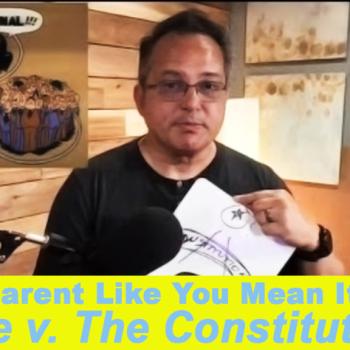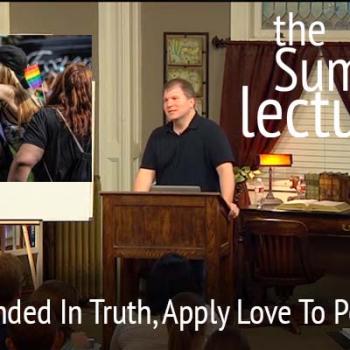
As you will hear in this PODCAST, in Matthew 18:21, Peter asked a profoundly important question. A question that haunted him. And if we are honest, a question that at times haunts us.
Matthew 18:21 reads,
“Then Peter came to Jesus and asked, “Lord, how many times shall I forgive my brother or sister who sins against me? Up to seven times?”
Can you think of any question that hits us more profoundly right where we live than this one? There is not a one of us who hasn’t been hurt significantly by someone or someones in the past.
Perhaps in the very recent past.
Perhaps the person’s hurts continue into the present.
Consequently, this whole issue of forgiveness — what it means and what it does not mean — could not come too soon, could not be more practical.
Especially given the timing and location of Peter’s question. Something that you will hear in this podcast.
“Lord, how many times shall I forgive my brother or sister who sins against me? Up to seven times?”
Let’s talk about this.
Ironically, the key to understanding the depth of this passage is what immediately follows the passage,
Jesus answered, “I tell you, not seven times, but seventy-seven times.
Well, that’s the verse that follows Peter’s question, but what happened chronologically after this discussion between Jesus and Peter can be found in John 7
Jesus did not want to go about in Judea because the Jewish leaders there were looking for a way to kill him. 2 But when the Jewish Festival of Tabernacles was near, 3 Jesus’ brothers said to him, “Leave Galilee and go to Judea, so that your disciples there may see the works you do. 4 No one who wants to become a public figure acts in secret. Since you are doing these things, show yourself to the world.” 5 For even his own brothers did not believe in Him.
A scant few words, but they speak VOLUMES!
Jesus’ own brothers were mocking Him. They were even encouraging them to go to Judea, where He could possibly be executed by the Jewish leaders.
So, when Peter asked Jesus, “How many times should I forgive my brother?”, look what happened immediately after Jesus gave the answer. A golden opportunity for Jesus to put it into practice. Jesus had His own brothers to forgive.
Then, after Jesus’ confrontation with His brothers, we see what happened next in Matthew 19,
When Jesus had finished saying these things, he left Galilee and went into the region of Judea to the other side of the Jordan.
The Jewish leaders were on the other side – the west side – of the Jordan, where they plotted to kill Him.
Now, all this to say, I wonder, how many people did Jesus have to forgive? When Peter asked Him, how many times should I forgive my brother or sister… who was on that list for Jesus? The Religious Leaders, certainly. They hated Him, destroyed His reputation, hunted Him, harassed Him, and threatened to kill Him. And they were supposed to be His fellow rabbis.
Then there were the crowds, who at first swelled to enormous numbers who would show up whenever Jesus appeared. But, by this time, they didn’t come in droves like before. Nor did they come to hear new revelations about God nor out of belief that Jesus was the Messiah. They came to see which magic trick He would perform, or simply to receive a quick-fix-healing. And whenever He didn’t pull off a trick, they went home.
Then there were the political leaders, like Antipas and his men. Antipas was the one responsible for beheading Jesus’ beloved cousin, John the Baptist.
Then, there were Jesus’ own brothers who thought that Jesus was out of his mind, didn’t believe a word He was saying and now was mocking Him.
But, back to Peter’s question regarding how many times should a Christ-follower be obligated to forgive a brother or sister. The prevailing Jewish opinion, later to be written formally in the Talmud,
“If a man commits a transgression, the first, second, and third time he is forgiven; the fourth time he is not forgiven.”
So, among Jewish thought, the obligation to forgive someone was three times. Therefore, when Peter was asking if seven was the new number to abide by, he was being quite magnanimous. Yet, Peter missed the mark, as Jesus replied “70 times seven”. And no, Jesus wasn’t meaning exactly 490 times, but was speaking in hyperbole to make a point. And the point is: You never stop forgiving.
But, what does it mean to forgive?
Too often, people add things to “forgiveness” that do not belong. And when we do this, it quickly becomes an insurmountable mountain that none of us are able to achieve. However, when you whittle it down to what forgiveness really is, you discover that it is actually very doable.
Now, when you and I get hurt, it is the natural response to become angry, bitter, resentful or even vengeful. There is no need to beat ourselves up over this point. It is completely natural. I don’t think Jesus ever became embittered, but I know that He did become angry. I don’t believe He was ever resentful, but He was tempted in every same way you and I are, so the options were definitely there.
We feel these things because we crave justice.
When evil is committed, we want the evildoer to pay a price.
Along with this, though, is the mistaken notion that if somebody hurts me, or hurts you, and we simply forgive, we are giving them a pass. They get away with the infraction they committed. And, if we forgive a serial offender (70 times 7), then there is no justice!
But, this is a gross distortion of what forgiveness is. Forgiveness has nothing to do with letting anybody off the hook. Nor does it have anything to do with us being okay when justice is not served. Justice is actually woven into the real meaning of forgiveness.
The problem is that when God put you and me together, He did not create us with the capacity to handle hatred. So, anyone who has harbored hatred in their hearts, it changes them into someone we don’t want to be with. When someone’s hatred is unchecked and unresolved, it has a devastating effect to them and everyone around them. And never forget that it will completely crush your relationship with God. Which is why we are warned in Hebrews 12:15,
Watch out that no poisonous root of bitterness grows up to trouble you, corrupting many.
Thankfully, the antidote for bitterness and hatred is… forgiveness.
And we have a choice. When we are unjustly wronged, we can choose to either drink the deadly poison of bitterness and hatred; OR we can choose to smell the sweet fragrance of forgiveness.
But, in order to choose forgiveness, we must first understand what it is. And what it is not.
Let’s start out by looking at the apostle Paul’s words in his book to the church in Rome. Now, keep in mind that the first eleven chapters of the book of Romans, Paul expresses just how guilty we – all of mankind – are; and how incredibly forgiving God is. Then, in chapter twelve, he brings the message of forgiveness home to us.
Never pay back evil with more evil. Do things in such a way that everyone can see you are honorable. 18 Do all that you can to live in peace with everyone.
19 Dear friends, never take revenge. Leave that to the righteous anger of God. For the Scriptures say,
“I will take revenge;
I will pay them back,”
says the Lord. (Romans 12:17-19)
It’s easy to see that it is implied here that there will be some people that we simply won’t be able to live in peace with. Jesus didn’t get the chance to make peace with the Religious Leaders or Roman Government Leaders before He died. They killed Him.
Yet, as we read in verse 19, revenge and payback fall into God’s job description. Not ours. This is how we are guaranteed that justice will eventually be served. Scripture tells us that no one gets away with anything.
And God is so much better at delivering justice than any of us can ever be.
Therefore, forgiveness is you and me relinquishing the right of revenge.
That’s it. Given that definition, we don’t have to worry about justice. Because we allow God to do His job instead of us trying to get in the way and take care of it ourselves (and do a much worse job at it).
Now, what does forgiveness not mean?
It does not mean to forget.
Even with as painful as some memories can be, it’s that very same memory that should motivate us not to deliver that kind of pain to someone else. Many times, it’s that very same painful memory that makes us compassionate toward other people.
Forgiveness does not mean that you like the person who wronged you.
In fact, nowhere in the Bible are we commanded to like everybody. We are commanded to love everyone. But there is a world of difference between loving and liking. Simply put, there are some relationships that fracture beyond repair. No matter what you do, there will be some people who just won’t allow peace to rest between the two of you.
Forgiveness does not mean that you trust the other person.
If you borrow my car and irresponsibly total it, then after I go through all the hassle and headache with the insurance company and car dealerships and DMV to get a replacement car you ask me to borrow my car again – I’ll forgive you. I won’t harbor any bitterness or resentment whatsoever toward you. But you’re not getting my car.
Forgiveness does not mean that we want to hang out with the person who hurts us.
In fact, I don’t believe that reconciliation is possible every time we are hurt. Because, I don’t think that reconciliation can happen until the offending party sincerely repents before God and before the person or people they hurt, asks for forgiveness, and makes restitution for their wrongs. Apart from that, I don’t believe reconciliation is even possible.
Therefore, forgiveness does not equal reconciliation.
These are two totally separate things. But, forgiveness is ALWAYS possible whenever ANYONE hurts us. We can relinquish the right of revenge.
But, these aren’t my own self-constructed opinions. I get this from the Bible.
My first argument, and I admit it is weak, comes from Paul’s next words in Romans 12:20,
20 Instead,
“If your enemies are hungry, feed them.
If they are thirsty, give them something to drink.
In doing this, you will heap
burning coals of shame on their heads.”
So, if I read this right, even after forgiving someone, it is still possible for them to be my “enemy”? Paul did not say, “Instead, ‘If your now forgiven and former enemies…’”
If they are not willing to repent, ask forgiveness and offer restitution, it seems as though, even according to Paul, they might still be my enemy. Even as Paul quotes Proverbs 25:21-22, he’s talking about heaping burning coals of shame on your enemy’s head… through acts of kindness.
Paul then offers the antidote for hatred and bitterness:
21 Don’t let evil conquer you, but conquer evil by doing good.
It’s one thing to say, “I forgive you”, but for me to treat someone kindly even though they repeatedly hurt us… that puts legitimate action to our cheap talk. That’s what happens when we afford grace to those who have wronged us. God will use our acts of kindness to bring repentance to the offender.
So once again, forgiveness is relinquishing the right of revenge. If we don’t, it’s almost as if we place a barrier of protection over the person who harmed us. As long as we are allowing our own bitterness and hatred to cover the person, we are protecting them from the direct hit of God’s discipline. But, if we relinquish that job to God, He has a clear shot to work in the person’s life as God sees fit.
Jesus puts skin and bone to this principle of forgiveness with this parable:
23 Therefore the kingdom of heaven is like a certain king who wanted to settle accounts with his servants. 24 And when he had begun to settle accounts, one was brought to him who owed him ten thousand talents. 25 But as he was not able to pay, his master commanded that he be sold, with his wife and children and all that he had, and that payment be made. 26 The servant therefore fell down before him, saying, ‘Master, have patience with me, and I will pay you all.’ 27 Then the master of that servant was moved with compassion, released him, and forgave him the debt.
28 “But that servant went out and found one of his fellow servants who owed him a hundred denarii; and he laid hands on him and took him by the throat, saying, ‘Pay me what you owe!’ 29 So his fellow servant fell down at his feet and begged him, saying, ‘Have patience with me, and I will pay you all.’ 30 And he would not, but went and threw him into prison till he should pay the debt. 31 So when his fellow servants saw what had been done, they were very grieved, and came and told their master all that had been done. 32 Then his master, after he had called him, said to him, ‘You wicked servant! I forgave you all that debt because you begged me. 33 Should you not also have had compassion on your fellow servant, just as I had pity on you?’ 34 And his master was angry, and delivered him to the torturers until he should pay all that was due to him.
35 “So My heavenly Father also will do to you if each of you, from his heart, does not forgive his brother his trespasses.”
If we don’t’ forgive, God has no alternative but to abandon us to the hatred and bitterness that will fester in our hearts and souls.
So, when Peter asked his question about how many times we should forgive someone; and Jesus reflected on all the different people who had recently wronged and was planning on harming Him, Jesus still commanded that we relinquish the right for revenge.
Jesus became the poster child for this, as he hung on the cross and said “Father, forgive them for they know not what they are doing.”
Another example of this would be Joseph (the Old Testament Joseph with eleven brothers, not Jesus’ dad). As a teenager, he was so hated by his brothers that they conspired to kill him. One brother persuaded the others not to kill him, but so sell him into slavery. He ended up a servant in Egypt under a man named Potiphar, whose wife falsely accused Joseph of raping her, landing him in prison for years. Through miraculous circumstances, Joseph was released from jail and God collected the debt. The land was hit with famine. But, due to Joseph’s leadership, Egypt had storehouses full of food. Consequently, Joseph’s brothers came to beg for food these thirteen years later. Joseph was now a grown man who looked and spoke like an Egyptian. Yet, when they realized that he was actually their brother, their knees knocked together out of fear. He had the opportunity for revenge.
Instead, Joseph gave us an amazing example of forgiveness in action.
20 You intended to harm me, but God intended it all for good. He brought me to this position so I could save the lives of many people. 21 No, don’t be afraid. I will continue to take care of you and your children.” So he reassured them by speaking kindly to them. (Genesis 50:20-21)
So, ask yourself if it is time for you to relinquish your right of revenge and allow God to collect that debt.













